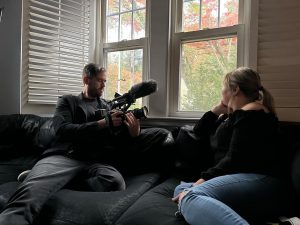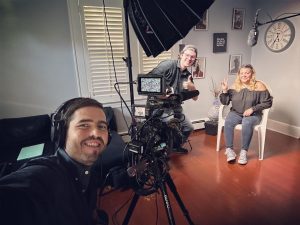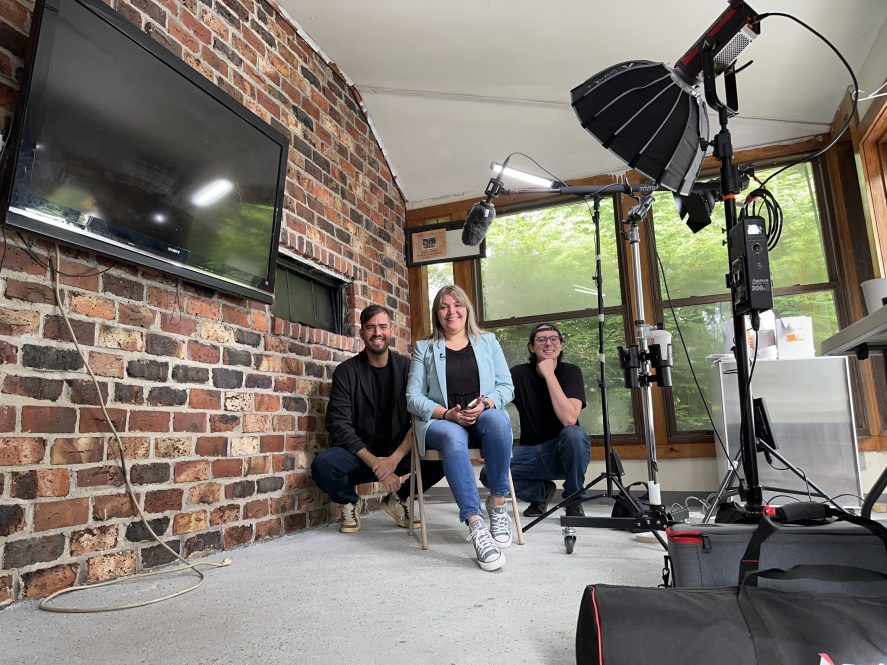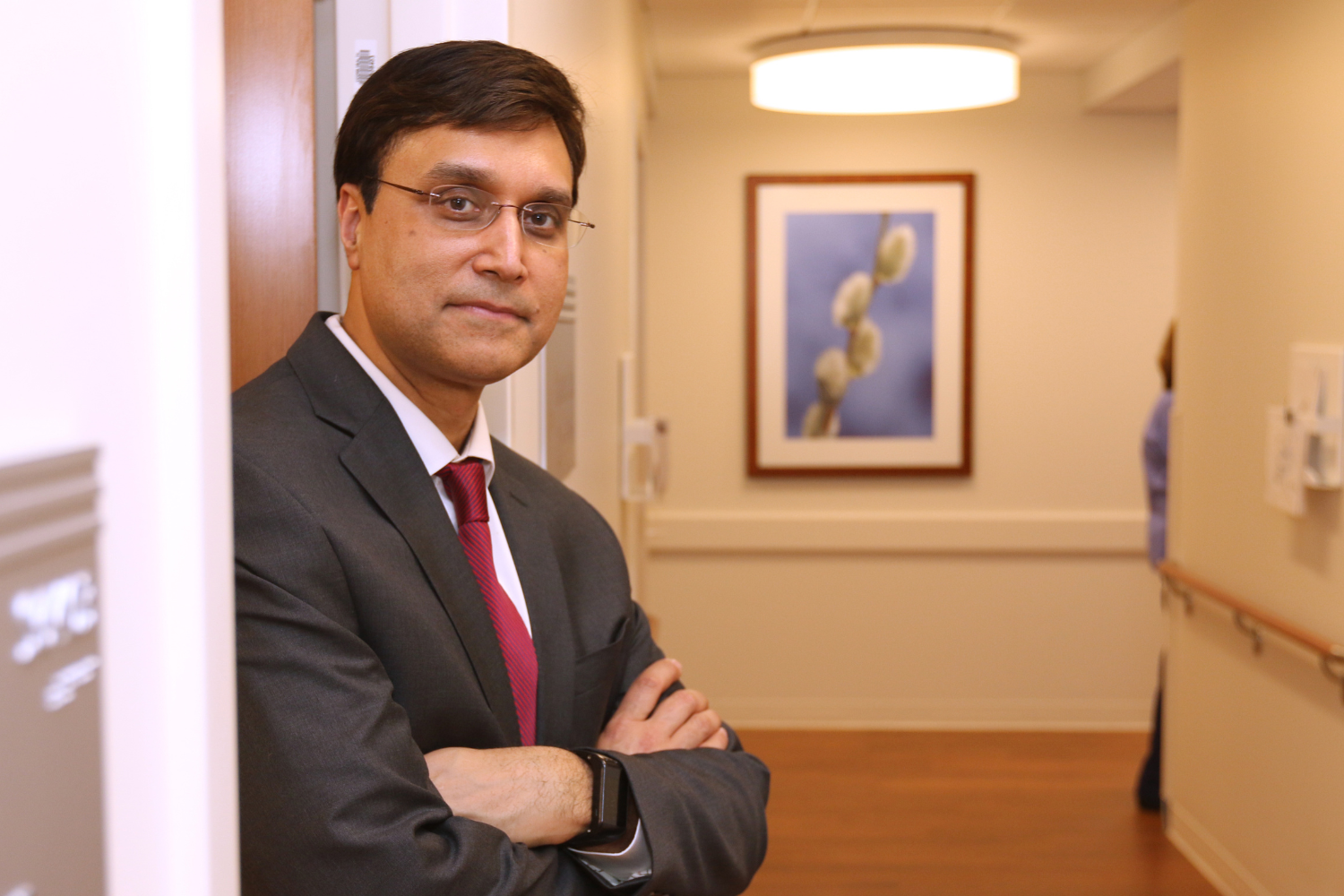How can a documentary show us the inside of a person’s mind?
Crafting a visual representation of mental health is a challenge that visual artists frequently grapple with – painters can rely on textures and colors, sculptors can work with wood or metal or stone, dancers can use movement to invoke emotion.
“But how do you illustrate mental health in a documentary?” asks UConn’s Oscar Guerra, an associate professor of film and video in the Digital Media and Design Department at UConn Stamford and Emmy award-winning documentary filmmaker.
“It’s really hard, because a lot of things happen in a person’s childhood, and a lot of things are happening in a person’s head, so you have to get creative to do it.”
For his latest project – supported by a fellowship from the UConn Humanities Institute – Guerra has taken on that creative challenge, aiming to present an exploration of mental health and the social, cultural, and political factors that can impact it – particularly for those who have been historically disproportionately affected, like members of the undocumented and working-class Latino communities who are frequently the subjects of Guerra’s films.

“In the same way that we all have physical health, we all have mental health. We also have different protections and vulnerabilities, or ‘risk factors,’ that will make us more or less likely to get some diseases and experience them more severely than others,” says Guerra. “COVID is a great example that we are all familiar with – for people of specific age groups, with certain health preconditions, or with socioeconomic disadvantages, COVID was more lethal than for the rest of the population.
“Mental health works similarly, not in terms of contagion – it’s not a virus that spreads – but in the sense of levels of risk. We all experience stress, anxiety, and sadness. That is part of the human experience. Still, some factors will make us more or less likely to develop mental health conditions such as depression, for example. These go from the individual level to the family, community, and broader social contexts. Some examples are childhood trauma, oppression, or systemic racism. Undocumented migrants are some of the most vulnerable sectors of the population, who are subjected to multiple levels of disadvantage, exploitation, and social rejection, making mental health a priority when we think about these communities.”
UConn Humanities Fellowships are opportunities for individuals to pursue advanced work in the humanities. For faculty like Guerra, fellowships offer a year-long opportunity to research, write, collaborate, and pursue work that extends and celebrates humanities scholarship.
Applications are accepted from all disciplines. Fellowship recipients are released from their teaching, departmental, and administrative duties, but are expected to produce scholarly articles, a monograph on a specialized subject, a book on a broad topic, an archaeological site report, a translation, an edition, or other scholarly tools.
For Guerra, the fellowship – which began in the fall semester and concludes this spring – offered the opportunity to build new connections as he dedicated his time to researching and producing a new documentary film.
“For this, I decided to reach out to certain people from prestigious universities,” he says. “When I was doing my literature review, I started getting a lot of big names from Johns Hopkins University, from the School of Epidemiology. I was lucky enough to get in touch with the doctors Carlos Castillo and Linda Bucay Harari, because I’ve read a lot of their articles.”
He also began working with Sarah Rendón García, a post-doctoral student at Harvard University and assistant professor in UConn’s College of Liberal Arts and Sciences Human Development and Family Sciences department whose research involves the intersection of immigration studies, developmental psychology, and social justice.
“Sarah was the one who put me in touch with our main participant of the film,” says Guerra. “Her name is Ruth, and Ruth has an extraordinary story.”
Originally raised in Honduras and now mother of four who lives in Connecticut, Ruth came to the United States to live with her mother when she was 15 years old and pregnant with her first child. She’d been primarily raised by her grandparents while her mother worked in the U.S. to provide financial support to the family, and Ruth struggled not only with relocating to a new and different place but also with connecting with her mother.
“It’s a story about a very difficult relationship with mom and daughter, because usually we think that they have a reunion and everything is happily ever after,” says Guerra. “That’s not the reality for many families. They’re with a complete stranger.”
Ruth came to the project with a surprising openness and willingness to share her very personal story, a critical component for the success of the project, says Guerra, who worked hand-and-hand with his subject in a way that has become a signature of his documentary style.
“I think that her story is typical, but it’s very atypical, and hopefully in that, people can find inspiration,” Guerra says. “As a character, she’s just so lovable. The few people that have seen the cut were like, man, you start rooting for her right away. She doesn’t present herself as a victim, or as a hero. She’s like, I’m an average person with a lot of flaws, and I’m trying to make this work.”
Ruth also shared a trove of personal and family recordings – offering Guerra an opportunity to create a visual story of a life, and it’s struggles, in a way that he didn’t originally anticipate.
“She has footage from 20 years ago, 15 years ago, 10 years ago – she has been documenting basically every year something, even starting with her mom, they were always buying camcorders,” he says. “In the documentary, you’re going to see footage from VHS-C, Super Hi8, MiniDV, early smartphones. You see her from when she’s really young. We start with pictures, but then you start seeing the changing technology, so I think that on its own is going to be interesting, and that’s what we needed to really illustrate certain parts of it.”

The mixed-media aspect of the project is something new for Guerra, who has made a name for himself with the personally crafted and close-up glimpses he offers into people’s lives through his films.
But what is similar, he says, is how inspired his work is by the stories of strong women and how relatable the stories he presents are, even while being extraordinary.
“I try to make sure that you as an audience are able to connect with the participant or the main character or one of the main characters, one way or another, because the reality is that we’re not that different,” he says. “We have very similar needs at the end of the day. As humans, as individuals, we have very similar needs – the need for affection, for understanding, of trying to do better for yourself and your family members.
“I try to go with the story and understand that we have complex realities, and I think that regardless if you’re Latino, if you’re undocumented or not, I think that you can still appreciate the value of the triumph of your own will and saying, ‘I have to do this and I have to get better at it, against all odds.’”
Guerra says he completed most of his production on the film during the first half of his fellowship. He hopes to have the film completed by the end of the spring.
For more information about faculty, graduate, undergraduate, and visiting fellowships through UConn’s Humanities Institute, visit humanities.uconn.edu.



